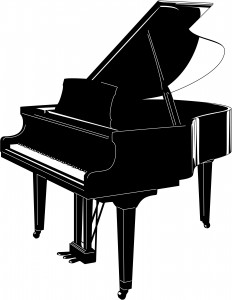This Wednesday evening, the Grinnell Symphony Orchestra performed three classical pieces at the Newton Correctional Facility in front of a crowded audience of prisoners.
The orchestra was conducted by Eric McIntyre, Music, who is involved with Grinnell’s Liberal Arts in Prison program, which brings Grinnell students and professors into the prison to teach courses to incarcerated individuals.
McIntyre first took the orchestra to perform at the prison in 2008. The feedback and reaction from both the prisoners and prison staff was so positive that the orchestra continued to perform at the venue.
“[After the first performance] I was told it was ‘the talk of the yard,’ and that one man described it as the best thing that had happened ever at the prison,” McIntyre recalled.
In a high-security facility like a prison, the logistics of transporting 49 music stands and many cumbersome instruments seems mind-boggling. However, traveling to the prison was not nearly as difficult as getting in.
The entire orchestra was subject to a background check and a thorough security check upon arrival, which took around one and a half hours to complete. Prison staff inspected every instrument and every orchestra member.
“It is a little bit intimidating,” said Jacob Ziontz ’16, a viola player and soloist in the performance. “It’s scary to be in that position where everything you do is being monitored so closely.”
While McIntyre has come to recognize many of the prisoners and prison staff, many of the orchestra students did not have the same degree of comfort, as Wednesday was the first time many of them had stepped foot inside of a prison. McIntyre admitted that he is always nervous when he talks with the orchestra about performing in the prison, but that it is rewarding to see the positive response and enthusiasm from both ends.
However, an excitement to share and play music seemed to have alleviated some of the anxieties about performing.
“It’s another concert, and it’s hard to turn down any concert opportunity. [Playing in prison] is certainly a different venue than any of us are used to, but it’s another concert. And we just want to get out there and play music,” Ziontz said.
Concertmaster Leah Meyer ’15, who performed in prison her first year, believes that the performance has an educational and mutually beneficial element.
“We’re almost teaching people about music. They’re definitely listening to it, and McIntyre explains the pieces,” Meyer said. “Overall, I think it’ll help them become more aware of classical music.”
McIntyre also shared that he was immensely amazed at the level of interest and attentiveness by the audience.
“They’re right there in the gym with us. And can be up close and personal—closer than an audience here can be actually. But I think for them, it means so much that they’re engaged,” McIntyre said. “They listen intensely. They listen quietly. They’re less distracted than most of the audiences we play for. And I think it means so much to them.”
Ziontz, who also took note of the intense attentiveness, said, “It is a very strange experience playing for an audience that’s completely and totally fixated on everything you do.”
For many of the prisoners, Wednesday was the first time they had ever seen and heard a live orchestra perform. McIntyre believes that it explores the human condition. Since classical music is so universal and timeless, it is something anyone can listen to.
McIntyre hopes that sharing a musical experience with prisoners will allow for students to see a higher meaning in musical performance.
“It’s really important for our students to see these are people. And they are people who can appreciate,” McIntyre said. “They’re known for the worst thing they did in their lives by the fact that they’re in [prison], but a lot of the men really appreciate it because they’re looking for something that is lasting and meaningful beyond themselves.”


















































